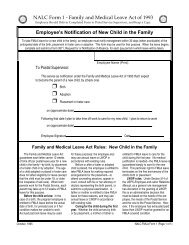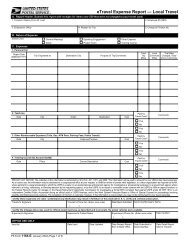Interviewing Postal Inspectors, Obtaining Their ... - NALC Branch 908
Interviewing Postal Inspectors, Obtaining Their ... - NALC Branch 908
Interviewing Postal Inspectors, Obtaining Their ... - NALC Branch 908
You also want an ePaper? Increase the reach of your titles
YUMPU automatically turns print PDFs into web optimized ePapers that Google loves.
<strong>NALC</strong> Arbitration Advocate Page 8<br />
Volume 2, Issue 2 May 1998<br />
The arbitrator turned aside an<br />
apparent management assertion<br />
that the grievant had to take the<br />
first two steps—(a) and (b)—before<br />
filing a safety grievance, noting that<br />
the grievant had notified her station<br />
manager of the situation and held a<br />
reasonable belief that nothing<br />
would be done. (The Rehmus<br />
award discussed below addressed<br />
this issue more directly.)<br />
Management further argued<br />
that Article 14 was not intended to<br />
be a vehicle for<br />
grievances alleging<br />
supervisory<br />
abuse or<br />
harassment.<br />
Rather, it asserted,<br />
Article<br />
14, Section 2<br />
deals with PS<br />
Form 1767, Report<br />
of Hazard,<br />
Unsafe Condition<br />
or Practice. The grievant had<br />
not filed the form, the management<br />
advocate argued, so the supervisor<br />
never had an opportunity to correct<br />
the condition during the tour.<br />
Arbitrator Hutt addressed and<br />
rejected the core of management’s<br />
arbitrability argument—that the<br />
subject of the underlying excluded<br />
it from Article 14 coverage, thus<br />
rendering the Step 2 filing improper.<br />
She found that although<br />
Article 14 does not explicitly reference<br />
stress, harassment or intimidation,<br />
... it was a reasonable interpretation<br />
by the Union that an unsafe<br />
workplace can include<br />
such conditions when the gravity<br />
of the conduct is severe.<br />
Moreover, the Joint Statement<br />
maintains harassment, intimidation,<br />
and bullying contribute to<br />
unsafe working conditions.<br />
Since Article 14 states the<br />
workplace must be maintained<br />
4$+64#614 '*/75<br />
4','%6'& /#0#)'g<br />
/'065 #4)7/'065<br />
6*#6 6*' )4+'8#0%'<br />
9#5 +/2412'4.; (+.'&<br />
in a safe and sanitary condition<br />
the Union asserted its perceived<br />
right to bypass Step 1.<br />
The arbitrator also employed<br />
the general presumption favoring<br />
arbitrability:<br />
... [R]esolution of disputes in the<br />
forum of arbitration is looked<br />
upon favorably. In order to preclude<br />
a party the opportunity to<br />
proceed through arbitration, the<br />
circumstances must clearly and<br />
convincingly support a decision.<br />
The contention<br />
of the <strong>Postal</strong><br />
Service was<br />
not convincing<br />
under the specific<br />
facts of<br />
this grievance.<br />
Arbitrator<br />
Hutt’s award<br />
sustained the<br />
union’s<br />
grievance on<br />
the merits, finding violations of the<br />
Joint Statement and the “mutual<br />
respect” provision of the M-39<br />
Handbook (Section 115.4). She ordered<br />
the supervisor to cease and<br />
desist from all violations of those<br />
provisions, and to post a written<br />
apology to the grievant for her<br />
“abusive comments, bullying, and<br />
harassment,” to be posted on the<br />
<strong>NALC</strong> bulletin board for 30 days at<br />
the station where the grievance<br />
arose and at the main post office.<br />
She also ordered management to<br />
restore the leave taken by the<br />
grievant when she left work early<br />
on the date of the incident. Arbitrator<br />
Hutt refused the union’s request<br />
for disciplinary action against the<br />
supervisor.<br />
It is notable that Arbitrator<br />
Hutt did not find a violation of Article<br />
14, nor did she find specifically<br />
that the grievance was properly<br />
filed at Step 2. Rather, she simply<br />
refused to bar arbitration of an otherwise<br />
timely grievance whose<br />
subject matter was closely related<br />
to safety and health matters.<br />
7%#+2#<br />
Regional Arbitrator Charles<br />
Rehmus decided a combined Article<br />
14/Joint Statement case the following<br />
month in C-17452, originating<br />
in Yucaipa, California. Local<br />
union representatives filed a<br />
grievance at Step 2 after Charles<br />
London, a new officer in charge<br />
(OIC) in the Yucaipa Post Office,<br />
gave stand-up talks threatening<br />
employees. Four union witnesses<br />
later testified that London said,<br />
“Bad performers will be fired” or<br />
“gotten rid of,” and that London<br />
had insulted a long-time carrier in<br />
public.<br />
As in the Long Beach case, at<br />
arbitration the <strong>Postal</strong> Service advocate<br />
argued that <strong>NALC</strong>’s grievance<br />
was improperly filed at Step 2 because<br />
the union had filed the<br />
grievance pursuant to Article<br />
14.2(c) prior to notifying the supervisor<br />
under 14.2(a) and notifying<br />
the steward under 14.2(b). However,<br />
Arbitrator Rehmus<br />
forthrightly rejected this strained<br />
procedural objection:<br />
I cannot accept this argument.<br />
First, steps (a) through<br />
(d) above are all noted as steps<br />
that “may” be used to bring an<br />
unsafe condition to Management’s<br />
attention. Logically, either<br />
(a) or (b) may precede c:<br />
Neither is set forth as the specific<br />
prerequisite to (c). ... I find<br />
no procedural defect in this<br />
grievance.<br />
Arbitrator Rehmus squarely<br />
rejected management’s further argument<br />
that a Joint Statement vio-<br />
(Continued on page 9)











